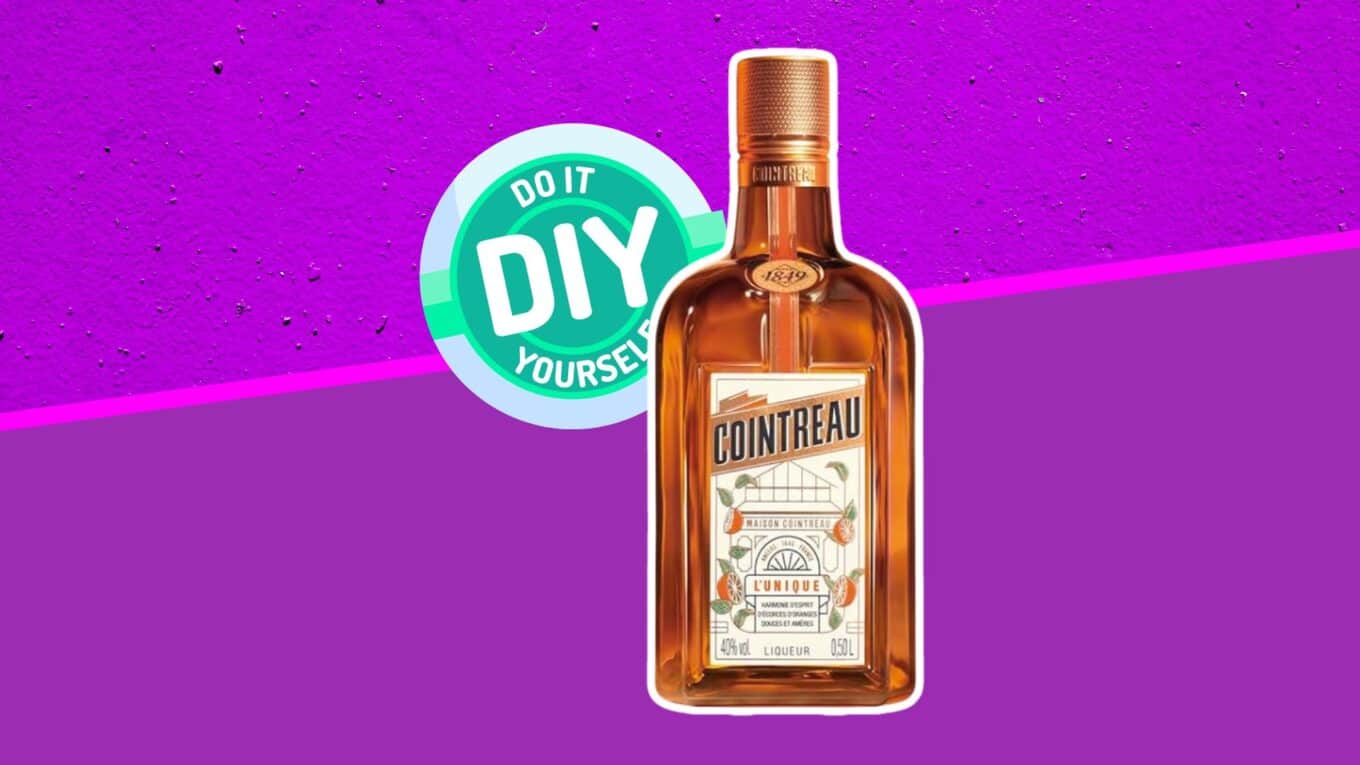Cointreau, a high-quality orange liqueur, is a staple in many classic cocktails.
However, it can be pricey, and you might not always have it on hand when the cocktail-making urge strikes. Using simple ingredients and techniques, you can easily create delicious homemade substitutes.
In this article, we’ll explore easy recipes for crafting your orange liqueur alternatives that closely mimic the taste and versatility of Cointreau.
We’ll guide you through the step-by-step process, providing tips for achieving the perfect balance of flavors.
Whether you’re a budding home bartender or simply looking to save money on cocktail ingredients, these homemade Cointreau substitutes will elevate your drink-making game.
Let’s dive in and discover how to create impressive orange liqueurs in your kitchen!
Understanding Cointreau

Cointreau is a premium French orange liqueur that has become a must-have in professional and home bars worldwide. Its distinct flavor and versatility make it an essential ingredient in countless classic cocktails.
In the world of mixology, Cointreau plays a crucial role in elevating the taste of various drinks.
It adds depth and complexity to cocktails, making it a favorite among bartenders and cocktail enthusiasts.
Unique Characteristics of Cointreau
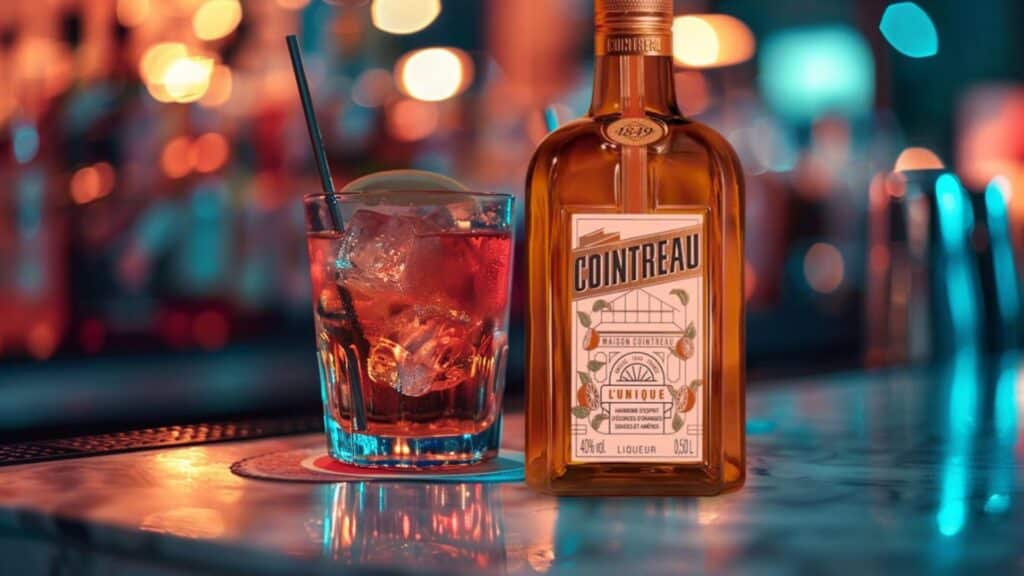
What sets Cointreau apart is its perfectly balanced sweet and bitter taste.
The liqueur’s clear, intense orange flavor comes from a blend of carefully selected sweet and bitter orange peels. This combination creates a rich, smooth taste that complements various ingredients.
The production process behind Cointreau is key to its exceptional quality. The orange peels are first macerated in alcohol to extract their essential oils and flavors.
This mixture is then distilled, resulting in a pure, aromatic liqueur that captures the essence of the oranges.
Cointreau is a staple in iconic cocktails, such as the Margarita, Cosmopolitan, and Sidecar. In a Margarita, Cointreau’s orange notes perfectly complement the tartness of lime juice and the boldness of tequila.
Similarly, it adds a delightful citrusy twist to the vodka-based Cosmopolitan and balances the Cognac and lemon juice in a Sidecar.
Beyond its use in cocktails, Cointreau can add a delightful citrus touch to various culinary creations.
Its subtle sweetness and intense orange flavor make it an excellent choice for flavoring desserts like chocolate truffles or fruit tarts, adding a sophisticated depth to these dishes.
Preparing Your Own Cointreau Substitute
Ingredients for DIY Orange Liqueur
| Ingredient | Quantity |
|---|---|
| Orange Peels (sweet variety) | Zest from 3 large oranges |
| Orange Peels (bitter variety) | 1 tablespoon of dried bitter orange peel |
| Vodka or Neutral Spirit | 1 cup (237 ml) |
| Brandy (optional) | 1 cup (237 ml) |
| Sugar | 2 cups (400 g) |
| Water | 1.5 cups (355 ml) |
| Additional flavorings (optional) | e.g., 1 vanilla pod or 4 whole cloves |
Equipment for DIY Orange Liqueur
| Equipment | Description |
|---|---|
| Fine-mesh strainer | Used for straining liqueur after infusion |
| Sealable jars or bottles | For steeping ingredients and storing the liqueur |
| Vegetable peeler or knife | For peeling oranges to obtain zest without much white pith |
| Saucepan | For preparing simple syrup |
| Measuring cups and spoons | For accurately measuring ingredients and liquid volumes |
Recipe 1: Classic Homemade Orange Liqueur Recipe
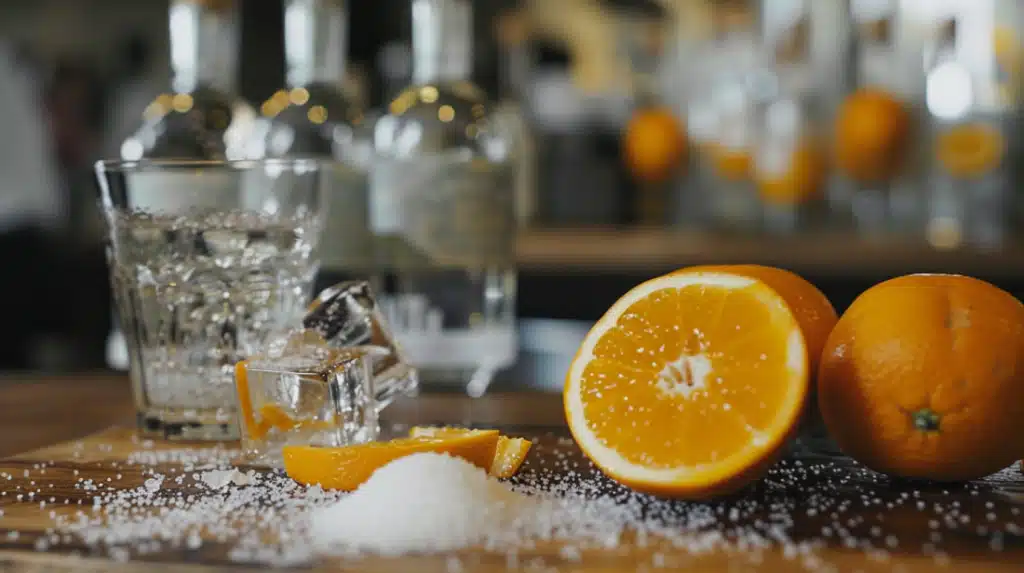
Creating your orange liqueur at home is a valuable skill for any cocktail enthusiast.
It controls your ingredients’ quality and flavor profile and lets you customize your favorite drinks.
This classic recipe is an excellent substitute for Cointreau, offering a cost-effective alternative without compromising taste.
You can experiment with different flavor combinations by making your orange liqueur and take pride in crafting a high-quality ingredient from scratch.
Ingredients Required
- 2 cups of high-quality vodka (80 proof)
- 4-5 organic oranges (for zest)
- 1 cup of granulated sugar
- 1 cup of water
How to Make
- Start by thoroughly washing the oranges and carefully removing the zest using a vegetable peeler, avoiding the bitter white pith.
- Combine the vodka and orange zest in a clean, sealable glass jar. Seal the jar tightly and let it steep in a cool, dark place for 2-3 weeks, shaking it gently every few days.
- After the steeping period, create a simple syrup by heating the water and sugar in a saucepan until the sugar dissolves completely. Allow the syrup to cool to room temperature.
- Strain the infused vodka through a fine-mesh sieve lined with cheesecloth into a clean bowl. Discard the orange zest.
- Combine the infused vodka with the simple syrup, stirring until well integrated. Pour the mixture into a clean bottle or jar and seal tightly.
- For optimal flavor, let the orange liqueur rest for an additional week. This will allow the flavors to meld together harmoniously. The liqueur will have a rich orange hue and be smooth and clear.
- Your homemade orange liqueur can be enjoyed in your favorite cocktails or as a flavorful addition to culinary creations.
Recipe 2: Sugar-Free Homemade Orange Liqueur Recipe
(a visual showing a person making orange liqueur at home)
As more people seek healthier alternatives, the demand for sugar-free options in homemade beverages has grown significantly.
Creating a sugar-free version of orange liqueur offers several benefits, such as reduced calorie intake and suitability for those following diabetic or low-sugar diets.
Additionally, omitting sugar allows the pure flavors of the oranges to shine through, resulting in a cleaner taste profile.
Ingredients Required
- 2 cups of high-quality vodka (80 proof)
- 4-5 organic oranges (for zest)
- 1 cup of water
- Sugar substitute (like stevia or erythritol) to taste
How to Make
- Follow the same initial steps as the classic recipe, steeping the orange zest in vodka for 2-3 weeks. However, when creating the simple syrup, replace the sugar with your chosen sugar substitute.
- Adjust the amount according to the desired sweetness level, considering that some sugar substitutes are sweeter than others.
- Heat the water and sugar substitute in a saucepan until fully dissolved. Allow the mixture to cool completely before combining it with the infused vodka.
- Strain the vodka through a fine-mesh sieve lined with cheesecloth, discarding the zest. Mix the infused vodka and sugar-free syrup until well combined.
- Taste the mixture and make any necessary adjustments to the sweetness level. Pour the sugar-free orange liqueur into a clean bottle or jar and seal tightly.
- Allow the liqueur to rest for a week to ensure the flavors are well-integrated and the texture is smooth.
Advanced Modifications and Flavor Enhancements
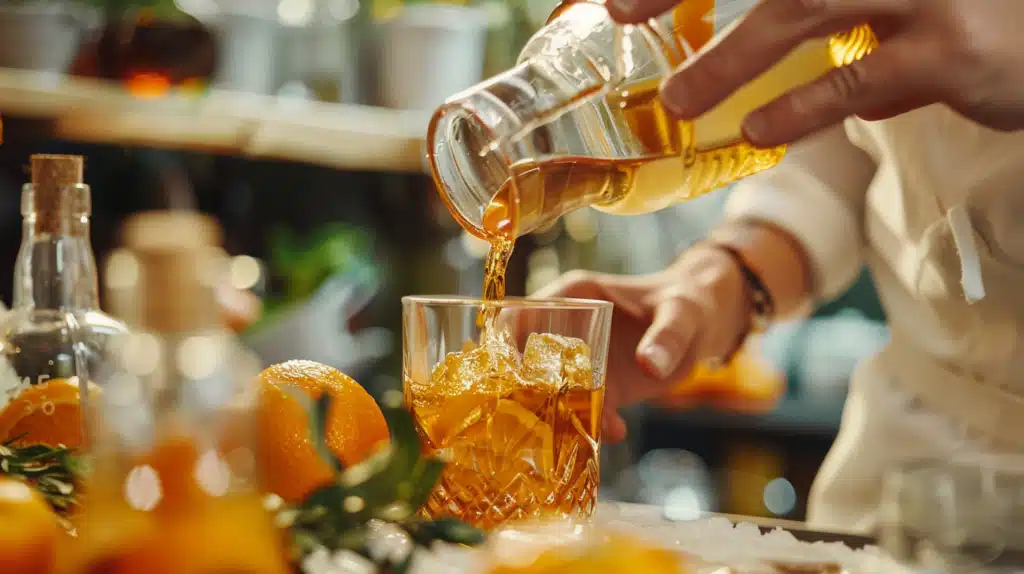
When experimenting with flavor modifications, it’s crucial to maintain a balance between sweetness, bitterness, and alcohol content.
A harmonious flavor profile ensures that no single component overpowers the others, resulting in a smooth and enjoyable drinking experience.
1. Elevating Complexity with Spices and Herbs
Adding depth and intrigue to your homemade orange liqueur is incorporating spices and herbs into the infusion process.
Add a cinnamon stick, a few cloves, or a star anise pod to introduce warm, spicy notes that complement the citrus base.
Herbs like rosemary or thyme can also contribute unique savory undertones, creating a more complex flavor profile.
2. Exploring Alternative Citrus Peels
While orange peels are the traditional ingredient in this liqueur, you shouldn’t be afraid to experiment with other citrus fruits.
Grapefruit, lemon, or lime peels can impart their distinctive flavors, allowing you to create a range of citrus-forward liqueurs. Just be mindful of adjusting the quantities to avoid overpowering the delicate balance of the drink.
3. Refining Sweetness to Taste
Adjusting the sweetness level of your homemade orange liqueur is a matter of personal preference. You can achieve this by using different types of sugars, such as raw or demerara, which contribute to subtle caramel notes.
Alternatively, sugar substitutes like stevia or erythritol can be employed for a sugar-free version.
Conducting taste tests during the preparation process will help you find the perfect level of sweetness for your palate.
4. Tailoring Alcohol Content
The alcohol content of your homemade liqueur can be modified without disrupting the infusion process.
If you prefer a milder drink, consider using a lower-proof vodka or diluting the final product with water.
For a stronger liqueur, opt for a higher-proof spirit like overproof rum or grain alcohol. Remember that higher alcohol content may require longer infusion times to allow the flavors to develop fully.
Comparison of Homemade Substitutes with Store-Bought Brands
| Comparison Aspect | DIY Liqueurs | Commercial Brands (e.g., Cointreau) |
|---|---|---|
| Cost | Generally cheaper, especially over time, as ingredients can be bought in bulk. | Typically, it is more expensive due to branding, marketing, and production costs. |
| Flavor Customization | High customization potential; can adjust flavors to personal taste. | Limited to the flavors available; no option for personal tweaks. |
| Time and Effort | Requires time and effort for preparation and aging. | Convenient, ready to use from the bottle with no preparation time. |
| Consistency and Quality | It can vary between batches, depending on skill and ingredient quality. | Strict production standards control consistent flavor and quality. |
| Shelf Life | Shorter shelf life; preservation depends on the method and ingredients used. | Longer shelf life due to professional manufacturing and preservatives. |
| Equipment and Knowledge | Requires specific equipment and some knowledge of infusion techniques. | No equipment or special knowledge is necessary. |
| Availability of Ingredients | Dependent on the availability of specific types of citrus peels and spirits. | Readily available in most liquor stores without the need for ingredient sourcing. |
| Personal Satisfaction | High level of personal satisfaction from creating something unique. | Less personal involvement in the product’s creation. |
| Alcohol Content Control | Ability to adjust alcohol content to personal preference. | Fixed alcohol content, with no option for adjustment. |
| Use in Cocktails | Adjustments may be required in cocktail recipes due to flavor variability. | Reliable performance in cocktails due to consistent flavor. |
Storage and Longevity
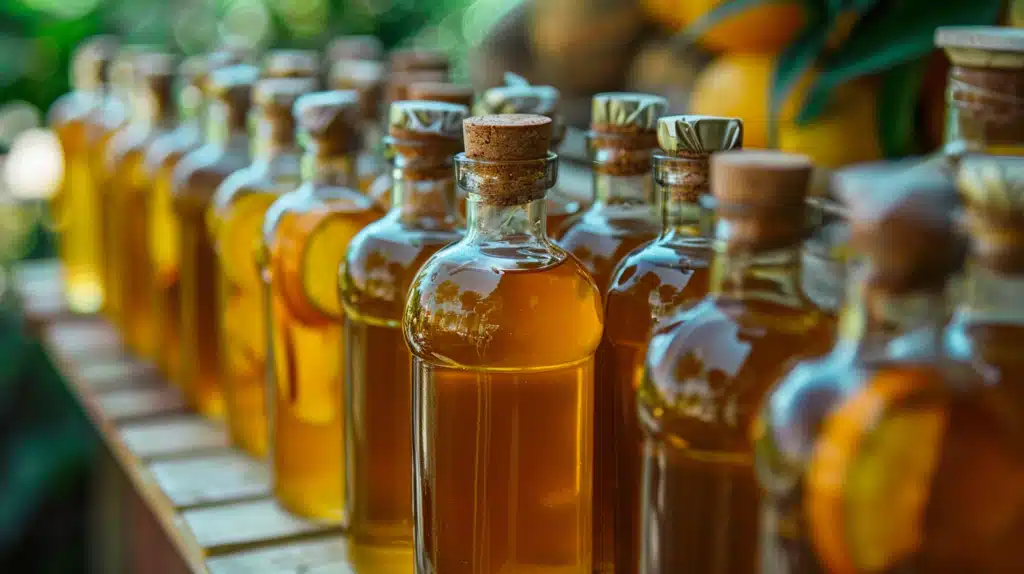
Proper storage is vital in preventing the degradation of your homemade orange liqueur. When stored correctly, your liqueur will retain its original flavor profile, aroma, and clarity for an extended period.
1. Choosing the Right Storage Containers
The choice of container is key when storing your homemade orange liqueur. Opt for dark glass bottles or jars that can be sealed tightly.
The dark glass helps protect the liqueur from light exposure, which can cause flavor deterioration and discoloration over time.
Ensuring an airtight seal prevents oxidation and evaporation, maintaining the liqueur’s integrity.
2. Finding the Ideal Storage Location
To further protect it, store your homemade orange liqueur in a cool, dark place away from direct sunlight and significant temperature fluctuations.
Extreme temperatures and light can accelerate the breakdown of flavors and aromas.
A basement or cabinet away from heat sources like stoves or radiators is ideal. Consistency in temperature is essential for preserving the liqueur’s quality.
3. Extending Longevity Through Refrigeration
While not always necessary, refrigerating your homemade orange liqueur can help extend its shelf life, especially if it contains fresh ingredients or has a lower alcohol content.
The cooler temperatures slow down any potential degradation processes. However, if your liqueur is made with high-proof alcohol and shelf-stable ingredients, room-temperature storage is usually sufficient.
Beyond the Bar: Non-Alcoholic Applications
Your homemade orange liqueur can add a delightful citrusy kick to various non-alcoholic applications.
Drizzle it over vanilla ice cream for a grown-up dessert, or add a splash to fruit salads for an extra flavor. You can also use it as a base for refreshing mocktails, combining it with sparkling water, fresh juices, and herbs.
In the kitchen, your orange liqueur can be a secret weapon for elevating savory and sweet dishes.
Use it to create zesty marinades for grilled meats or fish, or brush it over cakes and pastries for a citrusy glaze.
The options are endless, and the unique flavor profile of your homemade liqueur can add an extra layer of depth to your culinary endeavors.
Conclusion
In conclusion, crafting your homemade orange liqueur is a rewarding and enjoyable experience that allows you to customize flavors, save money, and impress your guests with unique, handcrafted cocktails.
Following the classic or sugar-free recipes and experimenting with flavor enhancements can create a delightful Cointreau substitute that rivals store-bought options.
Proper storage ensures your liqueur maintains its quality and flavor, allowing you to savor it for months.
Whether mixing classic cocktails with a twist or exploring new culinary applications, your homemade orange liqueur will add a special touch to all your creations.
So, gather your ingredients, unleash your creativity, and start an exciting journey of crafting your signature orange liqueur.
Your taste buds will thank you!

